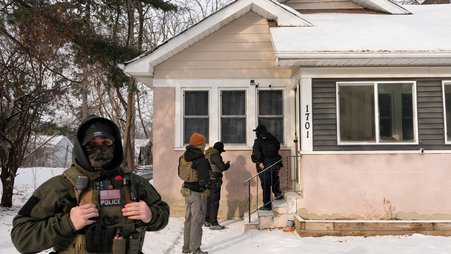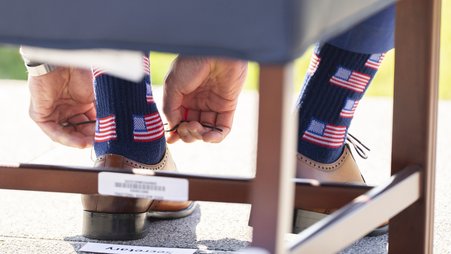President Donald Trump’s recent announcement that he plans to impose a 100% tariff on movies made outside the United States has created more confusion than the ending of “Inception.”
But there are two important questions no one seems to be asking. Namely: What in the world is Trump talking about when he claims that making movies outside the U.S. is a national security threat? And why should anyone — let alone any court — ever take this administration seriously again when it claims national security is endangered?
In his Truth Social post about the movie tariff, Trump makes two main arguments (if you can call them that) based on national security. Both are completely unjustified.
First, he claims that the U.S. filmmaking industry is being “devastated” by other nations trying to lure moviemakers to their countries. “This is a concerted effort by other Nations,” he wrote, “and, therefore, a National Security threat.”
But economic harm doesn’t necessarily mean national security harm. While it may mean less money for parts of the American film industry, filming “Mission: Impossible — The Final Reckoning” in Norway doesn’t make us less secure. Plus tariffs are a nonsensical way to safeguard national security — foreign adversaries can attack us as long as they pay a fine?
Also, some movies simply must be made outside the U.S. The last three winners of the Academy Award for Best Documentary — “No Other Land,” “20 Days in Mariupol,” and “Navalny” — were all filmed outside the U.S. because they told stories from outside the U.S. Slapping movies like those with tariffs will make them more expensive and less likely to be made or shown in the U.S., depriving Americans of important perspectives about what’s going on in the rest of the world.
Trump’s second national security argument is that foreign-made movies are “in addition to everything else, messaging and propaganda!” It’s a rich claim, given Hollywood’s history exporting U.S. propaganda and present-day examples of links between U.S. films and U.S. interests.
Trump’s national security claims are just like the movies: all smoke and mirrors.
It’s also essentially the same argument used by both Trump and former President Joe Biden to justify the TikTok ban, i.e., that foreign-made mass media threatens national security by exposing Americans to foreign propaganda. The Supreme Court got it wrong in upholding the TikTok ban. But it applied a lower level of First Amendment scrutiny to the law based on TikTok’s special characteristics, including its collection of vast amounts of data. That leniency shouldn’t apply to a tariff or other law that burdens speech simply because it’s created outside the U.S.
And have you noticed that we haven’t heard much about the app’s supposed massive threat to our national security lately? That’s because Trump no longer wants to ban it, now that he’s amassed millions of followers there and met with the Republican megadonor who also owns part of TikTok. The social platform continues to operate in the U.S., and somehow our national security has remained intact.
This all goes to show that, just like many other purported national security concerns, “propaganda” is simply a convenient argument for an administration to invoke when it suits its purposes and to discard when it doesn’t. Other administrations have also invoked national security when convenient to avoid hard questions or uncomfortable truths. But Trump is taking it to a whole new level.
According to Trump, almost anything can be justified by citing national security: deporting students who write op-eds critical of Israel in college newspapers, refusing to tell a judge what time U.S. planes carrying migrants took off, even attacking Greenland.
Most concerningly for journalists and their sources, the Trump administration has also launched numerous leak investigations and rolled back protections for journalists’ records, all in the name of national security. But documents released to Freedom of the Press Foundation (FPF) via the Freedom of Information Act show that the reporting the administration cited to justify its crackdown on leaks to reporters did not threaten our national security as claimed.
Instead, they exposed that the administration’s justification for invoking the Alien Enemies Act to deport Venezuelans to El Salvador was rejected by American intelligence agencies. When Trump claims to be protecting the homeland from foreign adversaries he is often actually protecting his own false narratives from domestic scrutiny.
Many of these national security claims will be challenged in court, and all of them should be weighed skeptically in the court of public opinion. Given this administration’s track record, judges and the public must remember that Trump’s national security claims are just like the movies: all smoke and mirrors.





